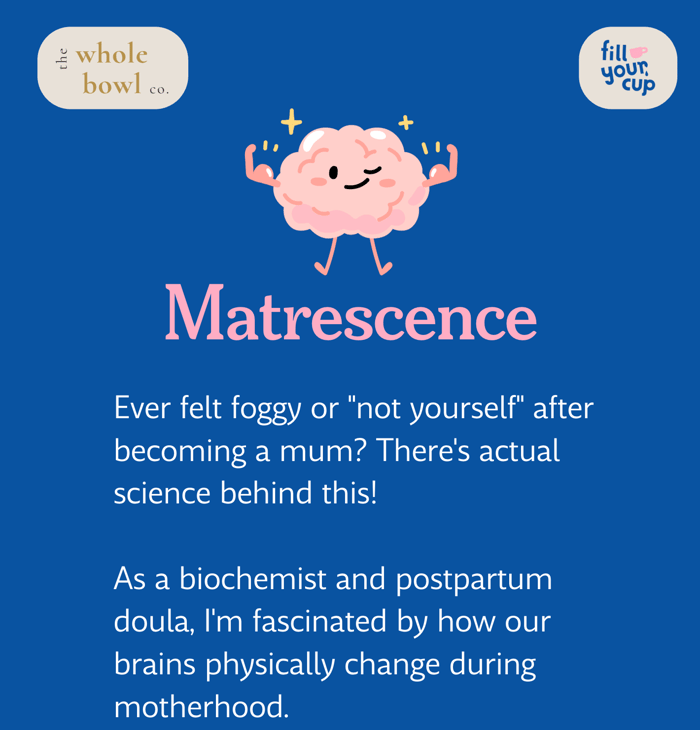Matrescence: The Science Behind Why Mums Feel Foggy and Experience Identity Shifts
By Dr. Renee White, Biochemist, Doula and Founder of Fill Your Cup
Have you ever felt like you're having an out-of-body experience after becoming a mother? That strange feeling of being "untethered" from your former self? If you're nodding along, you're experiencing what anthropologists call "matrescence" - and there's fascinating science behind why this happens.
What is Matrescence?
I recently conducted a postpartum planning workshop with several couples and asked, "Has anyone heard of the word matrescence?" Not a single hand went up. This was thought-provoking, because in my world, it's a term I hear constantly.
So let's go back to basics. Matrescence describes the profound transition women experience as they become mothers. It's similar to adolescence, which marks the transition from childhood to adulthood, but involves significant physical, emotional, and psychological changes specific to motherhood.
The term was first introduced in the early 1970s by Dana Raphael, an American medical anthropologist who studied women during and after childbirth. She highlighted society's need to recognise the unique challenges and transformations women undergo during this period.
Your Brain on Motherhood: The Neurological Transformation
As a scientist, I always go back to the "why" when explaining maternal identity shifts. When we understand the underlying mechanisms, everything tends to fall into place.
Here's something remarkable that many people don't realise: from the moment of conception, your brain begins to remodel. This beautiful neuroplasticity (neuro = brain, plasticity = moldable) causes measurable changes in your brain structure.
During pregnancy and postpartum, our gray matter actually shrinks - which sounds alarming, I know! Everyone calm down, it's okay. What's actually happening is a sophisticated remodeling process that neuroscientists call the "levelling up and fine-tuning of maternal circuitry."
The Evolutionary Advantage of the "Mum Brain"
This neuroplasticity results in improvements in memory, emotional intelligence, and creates behaviours where mothers become more flexible, responsive, and adept at problem-solving. From an evolutionary perspective, this makes perfect sense.
We develop the ability to watch people's faces and understand their emotions without them saying a word. This is crucial because newborns can't speak our language - they communicate through crying and subtle facial expressions. Our brains rewire to make us perceptive to these non-verbal cues.
That's why you find yourself staring at your baby for hours on end. You're not just admiring their cuteness (though they are adorable); your brain is constantly fine-tuning its perception of their changes and needs. It's an evolutionary mechanism that helps ensure your baby's survival.
The "Baby Brain" Phenomenon
This remodeling process is responsible for that mental fogginess many new mothers experience - what some dismissively call "baby brain." I'm personally not interested in that phrase; we can throw it in the bin. But this unusual feeling is a fundamental cause of the identity shift mothers experience, where your sense of self becomes something very different.
I felt it personally - like having an out-of-body experience. I remember checking in with my psychologist at the time saying, "I don't feel like myself anymore. Something's changed, and I don't like it." I thought I had postnatal depression or anxiety. (I did have anxiety, but not depression.) It was this sense of shifting identity, of feeling untethered and needing an anchor - which is precisely what your village should provide during this transition.
The Identity Pivot
After becoming a mother, it's not uncommon to change careers dramatically - making huge 180-degree pivots and retraining for something completely different. This happens because you have fundamentally changed as a person. Your priorities and values shift, and things that aligned with your pre-motherhood values may no longer fit.
For deeply independent, A-type personalities like myself, this transition can be particularly challenging. You go from being self-sufficient to having a beautiful little baby who is 100% reliant on you for survival. The neurological changes that enhance bonding and attachment can create tension with your previously independent identity.
Embracing the Transformation
Understanding the science behind matrescence helps normalise this profound identity shift. Rather than fighting against the fog or mourning your previous self, recognising these changes as both natural and purposeful can be incredibly freeing.
Your brain is literally remodeling itself to help you become the mother your child needs. This doesn't mean losing yourself entirely, but rather evolving into a new version of yourself – one with enhanced emotional intelligence, problem-solving abilities, and a deeper capacity for connection.
The journey of motherhood transforms us at the cellular level. By understanding and honouring this transformation, we can approach this identity shift not as a loss, but as an evolution - one that brings challenges, yes, but also profound growth and new dimensions to who we are.
Dr. Renee White is a biochemist, postpartum doula, and founder of Fill Your Cup, Australia's first doula village. She is also the host of The Science of Motherhood podcast, which bridges the gap between key opinion leaders and the public to discuss the latest research and separate fact from fiction.


